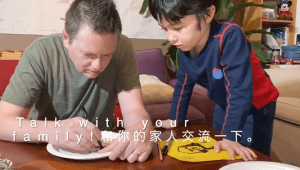Written by: Lucia Hu, School Counsellor (Regency Park Campus)
How precious it is to have opportunity for spending time with our loved ones in person. However, some parents struggle to enjoy or know how to “be with” our most precious treasures – our kids. As someone whose own Chinese parents didn’t “play” with me and rarely showed physical affection, I had to learn and practice how to play with my own boys in a way that had not been modeled.
We may already know that “play” helps children develop gross motor skills, creativity, problem solving and much more. Many other sources can provide this information.
More specifically, you might wonder why it’s not enough for kids or siblings to just play with each other? Our children naturally crave our attention and develop a sense of their own value as parents communicate that they are valuable by focusing attention on them. Research has shown that parent-child play helps with cognitive development, building competence and peer group leadership. Parents’ interaction also helps build kids’ self-esteem and learn to regulate their emotions and manage social interactions. The hormone oxytocin will increase in our system as parents engage in affectionate or stimulatory play with their little ones. Oxytocin is linked to stress reduction and promotes relaxation, mental stability, and trust. Parent-child play helps us build strong relationships with our kids by supporting healing from disagreements and resentments. This transformation of hurts into healing also supports developing resilience.
I understand it’s good to play and interact with my kids, but…it is really hard to have time or energy, to know what to play and sometimes I don’t like it. Many of us struggle with these same thoughts and feelings. Parents who work late and barely make it home before the kids go to bed, those who travel or work in another city may be the most hard hit with these thoughts and feelings. Those who are physically present but stressed with work at home experience the same kind of challenge. While I am a firm proponent of parents prioritizing time for themselves to de-stress and do what you love, we can still find one small step to further invest positive time with our children.
 How much time is enough? Professionals have suggested at least 20 to 30 minutes of focused interaction per day. For parents who may not be home to see the kids every night, every minute counts. If you make it home 10 minutes before your child sleeps, that 10 minutes of undivided attention of chatting, reading a part of a story, or just to give a hug and say “I love you” makes a difference. No matter the amount of time, it is the quality of the interaction that matters. If we have negative feelings that can make our child feel we’re irritated or mad at them, or we don’t enjoy playing with them, it may be better to postpone play time.
How much time is enough? Professionals have suggested at least 20 to 30 minutes of focused interaction per day. For parents who may not be home to see the kids every night, every minute counts. If you make it home 10 minutes before your child sleeps, that 10 minutes of undivided attention of chatting, reading a part of a story, or just to give a hug and say “I love you” makes a difference. No matter the amount of time, it is the quality of the interaction that matters. If we have negative feelings that can make our child feel we’re irritated or mad at them, or we don’t enjoy playing with them, it may be better to postpone play time.
What to do with the 20 to 30 minutes?
Do:
- Silence the phone and put electronics elsewhere
- Fully observe and listen to your child
- Let them tell you what they want to play and what they want you to do
- Narrate what they’re doing or feeling (ie. “You stacked that so well. Looks like you’re feeling very pleased with yourself.”)
- Focus your words on praise or positive comments
- Ask what made them happy, sad, or mad
Do not:
- Be distracted by your phone
- Talk about their bad behavior/attitude
- Talk about homework or poor marks
- Discuss scheduling tutors, sports, music practice, etc.
- Withhold parent-child interaction as a consequence for bad behavior
Ideas for different ages:
- Sorting toys
- Pretend play and dress up
- Storytelling (can also use dolls or puppets)
- Making a craft, drawing or coloring
- Playing ball
- Board games
- Taking a walk













